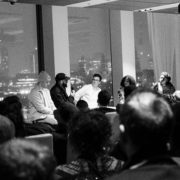Music Supervisor @jumiaa Speaks To Us About How She Seeks To Create Impact Within The Music Industry

We spoke to Senior Music Supervisor and Cultural Creator at Pitch & Sync Jumi Akinfenwa. Jumi based in East London, has worked within the music industry for the past two years and seeks to use her skills and knowledge to help others. She is currently the co-chair of the Intersectionality Committee for shesaid.so, the leading organisation for women in the music industry. Read more as we find out more about how Jumi seeks to create impact within the industry:
What made you want to go into the music industry?
“I’ve always known that I didn’t really belong in a strictly corporate environment, so I knew I definitely wanted to do something creative. My family aren’t particularly artistic or musical, though there was always music in the house. My dad is really into jazz and yacht rock, so I guess I inherited some of that.
When I was younger. I used to listen to a lot of music, like anyone else, but I was also really interested in music history and how music applied to wider culture. I also used to make lots of mixtapes and CDs for family and friends as well, though I never really thought my interest in music was any more intense than the average person.
It wasn’t really until people picked up on the fact that I always had a musical reference for anything or that I just knew a lot of random music trivia and facts that I started to look for ways to actually use that as a future career. I just came to the realisation that there wasn’t anything else that I was as interested in or had as much knowledge about.”
Tell us more about the work you do within the industry, and how you create impact?
“Being a music supervisor is a pretty unique job. It’s one of those that people always ask you what it is when you tell them what you do for a living, as it’s not exactly self explanatory. Essentially, the role involves creatively sourcing and licensing music for use in visual content, be that Film, TV, advertising or video games, and that music can either be already commercially available or specifically composed for that project. It’s a really fun and varied career as you really get to cover a wide range of genres as well as working hands on with artists and composers.
You definitely create a huge amount of impact without people realising it. Very few people really sit and watch TV and think about who the person is that chooses the tracks or how they came to that decision. There’s a lot of strategy involved and usually quite a bit of back and forth to come to a final decision, especially if there are several parties involved. It’s very rarely the case of just plonking a track on the final edit.
I get a lot of musicians sending me tracks and asking me to place it in a project but unfortunately, that’s not how it works. You need to think about the audience and the music needs to make sense and needs to generate an emotional response. Sometimes, the music alone can really shape the whole project. I’m pretty sure that everyone has those musical moments that they saw in a film or on an advert that stick with them, so being able to be part of that process and being able to create musical memories is incredibly exciting to me.”

We hear you seek to host events that provide support to young BAME individuals, who would like to learn about music supervision. We would love to hear more about this?
“Back in November, I started an initiative at my company called ‘Make Noise’, which was to encourage the creative industries to be more vocal about industry wide inequality and use the power of music to do so, in an effort to not only make workplaces more diverse and accessible when it comes to race, background, gender, disability etc but also more inclusive and allow all creatives to flourish but crucially, also make mistakes. So far, there have been two events, the first being with advertising agency, Havas, which focused on brands adopting greater nuance when it comes to using music by minority ethnic artists and the second with production company Compulsory and Ogilvy Roots, which focused on the journey from music video director to commercial director and whether or not your creative freedom is hindered.
The next step is to do a community facing event, essentially providing an insight into a career in music supervision and what it entails. As mentioned, not many people really know what it is or how to become one, so it’s something that I definitely want to publicise, especially given how influential it can be on popular culture. I went to loads of ‘intro to the music industry’ events as a teenager and never came across sync and music supervision, but it’s one of the most lucrative arms of the music industry. Moreover, as a black woman, it’s a bit sad to see how undiverse it is. I absolutely adore the London sync community, it’s super tight knit and I have made some lifelong friends through it, but it is overwhelmingly white. In the words of Dorian Corey of ‘Paris is Burning’ fame – that’s not a read, it’s just a fact.
I saw a tweet not too long ago that said something about how we’ve got a fully functioning black music industry, but if you have a look at sync, there’s only really a handful of non-white people in it, so I want to try to educate young minority ethnic people about sync and perhaps highlight some transferable skills that they might already have that would make them suitable for the job. I think there is this misconception that you have to be a musician or composer, or you have to have done a music degree to be a music supervisor.
I think it’s also really important to make accessible resources as well. There are lots of courses and events on publishing and sync but they are rarely free or low cost, so that already alienates a large segment of the population. I think definitely highlighting existing literature as well giving skills about mentoring and networking are really important here. I’m quite fortunate in the fact that I grew up in an environment where I was always told that I was going to succeed no matter what, so that definitely gave me the kick up the arse I needed when it comes to networking and approaching people and asking for advice, but it’s just not the case for everyone.
If you come from a background or even a school with alumni that are all successful, then inherently, you’ve got that extra push and that extra social capital when it comes to advancing in this sort of industry. Unfortunately, we live in a society where not everyone is privy to this level of privilege and it’s something that not everyone is able to recognise. It’s not just the case of putting more minority ethnic people into the sector, it’s also providing them with the tools for survival, because it can get tough, and as friendly as everyone is, it’s still a competitive business at the end of the day. I’m really keen to bridge the gap and include those who are arguably contributing to the culture but can’t be part of the process that facilitates its usage in mediums that are meant to be speaking to them.
As much as all of this might scare you off, it’s an insanely rewarding job and industry to be in and I’m so glad that I’m doing it, so to be able to pass on the insane amount that I’ve learned in such a short space of time and open someone’s eyes up to a career that they might not have fathomed before is really what appeals to me.”
In what ways do you look to create change in the music industry?
“In any way I can! I’m definitely someone who tries to look for opportunities where there may not be any. I think the biggest thing is just being nice to people. It’s an insanely small industry and particularly in sync, people like to stay once there and just move around different companies, so it’s no good burning bridges, as relationships are hugely important (though I would never do that regardless!).
As a kid, I definitely had this utopian view of the industry, and it’s not really like that. There is still a distinct lack of diversity and visibility at the top and I think this is down to there being a big issue at mid-level of employee drop off amongst ethnic minorities and women, in particular, and that really boils down to the lack of attention paid to inclusion. Diversity schemes are futile at best if the existing workforce isn’t educated on the issues and aren’t accommodating of diverse voices and allowing them their space to create freely.
I think ultimately, the biggest change I want to see is that I won’t have to talk about diversity and inclusion in music anymore, though I must admit, that is a pipe dream…”
If you could offer one tip to aspiring music supervisors, what would it be?
“Research, research, research! That’s basically how I got my job and has been the thing that has made it easier but also that bit more interesting. By research, I mean really digging into the archives and discovering new music via a variety of sources (beyond streaming!) and how it can align with different stories and visuals. Have a playlist for absolutely any situation or mood and definitely go across genres and eras where possible. Don’t be afraid to go super niche, for example, one of my playlists is called ‘Divorced 80’s Sitcom Dad’ and is literally just a soundtrack for a made up character for a made up sitcom and what I think that character would listen to.
Paying attention to instrumentation and sounds when it comes to music that is used is important here as well, for example, I’ve got a playlist of about 300 tracks that feature prominent clapping, just because at the time, I was seeing lots of adverts that had songs with hand claps in them. It just means that there are very few briefs where I don’t at least have an initial idea.”

